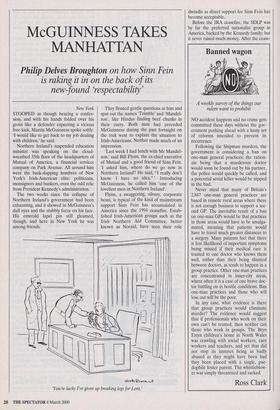Banned wagon
A weekly survey of the things our rulers want to prohibit
NO accident happens and no crime gets committed these days without the gov- ernment pushing ahead with a hasty set of reforms intended to prevent its recurrence.
Following the Shipman murders, the government is considering a ban on one-man general practices; the ration- ale being that a murderous doctor would soon be found out by his partner, the police would quickly be called, and a potential serial killer would be nipped in the bud.
Never mind that many of Britain's 2,847 one-man general practices are based in remote rural areas where there is not enough business to support a sec- ond GP. The inevitable result of a ban on one-man GPs would be that practices in those areas would have to be amalga- mated, meaning that patients would have to travel much greater distances to a surgery. Many patients feel that there is less likelihood of important symptoms being missed if their medical care is trusted to one doctor who knows them well, rather than their being shunted between doctors, as tends to happen in a group practice. Other one-man practices are concentrated in inner-city areas, where often it is a case of one brave doc- tor battling on in hostile conditions. Ban one-man practices and those who will lose out will be the poor.
In any case, what evidence is there that group practices would eliminate murder? The evidence would suggest that if professionals who work on their own can't be trusted, then neither can those who work in groups. The Bryn Estyn children's home in North Wales was crawling with social workers, care workers and teachers, and yet that did not stop its inmates being as badly abused as they might have been had they been placed with a single, pae- dophile foster parent. The whistleblow- er was simply threatened and sacked.
Ross Clark


































































 Previous page
Previous page